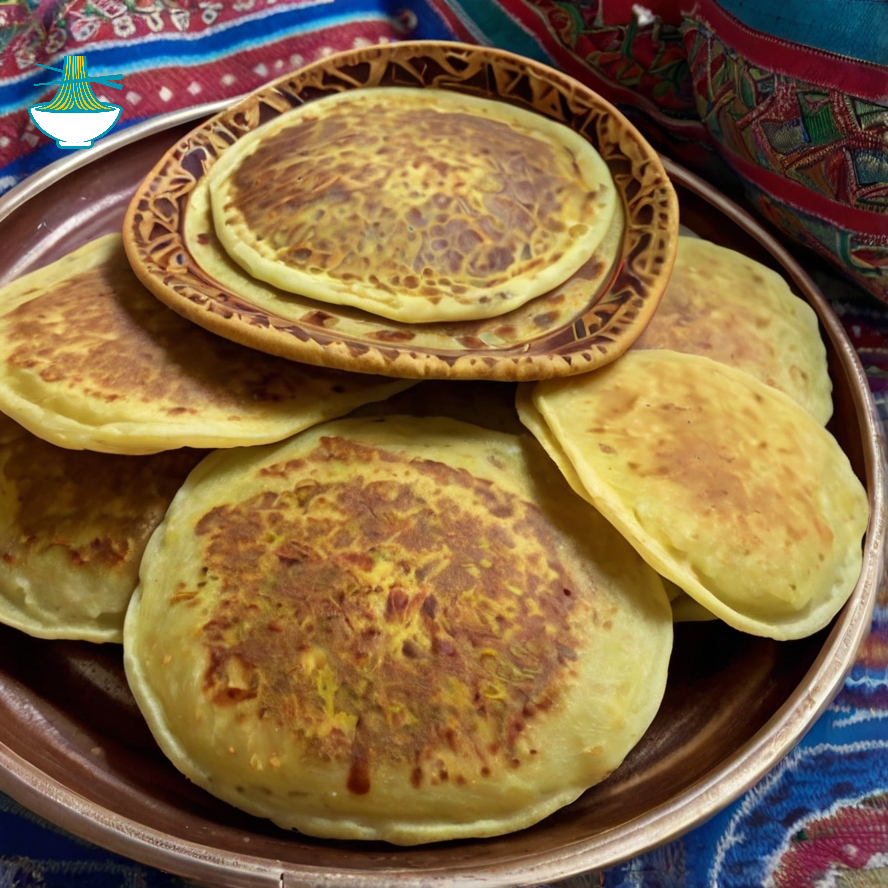Djibouti Lahoh, also known as Lahoh or Laxoox, is a traditional flatbread with a rich cultural heritage in Djibouti and Somalia. This soft, spongy bread is an integral part of the region's cuisine, often enjoyed for breakfast or as a snack. Its history is deeply intertwined with the nomadic way of life, where simplicity and sustenance were key.

Lahoh originated among the Somali people, whose culinary practices were shaped by their nomadic lifestyle. This bread was designed to be easily prepared and transportable, making it a staple for those constantly on the move. Over time, it became a beloved dish in Djibouti as well, highlighting the close culinary ties between the two regions.
Ingredients:
- 2 cups all-purpose flour
- 1 cup semolina flour
- 1 teaspoon active dry yeast
- 1 teaspoon sugar
- 1 teaspoon salt
- 2 cups warm water
- Cooking oil (for greasing the pan)
Instructions:
Step 1: Prepare the Batter
- In a large mixing bowl, combine the all-purpose flour, semolina flour, yeast, sugar, and salt. Mix well.
- Gradually add warm water while stirring to create a smooth, runny batter without lumps.
Step 2: Ferment the Batter
- Cover the bowl with a clean kitchen towel or plastic wrap.
- Let the batter ferment for 3-4 hours in a warm place until it rises and becomes slightly bubbly.
Step 3: Cook the Lahoh
- Stir the fermented batter. The consistency should be slightly thicker than pancake batter; adjust with water if needed.
- Heat a non-stick skillet over medium heat and lightly grease it with cooking oil.
- Pour a ladleful of batter onto the skillet, spreading it in a circular motion to form a thin pancake.
- Cook for 2-3 minutes on each side until golden brown and slightly crispy, forming small air pockets.
Step 4: Serve and Enjoy
- Remove the Lahoh from the skillet and place it on a serving plate.
- Lahoh can be served folded or rolled with various toppings like honey, butter, jam, or savory sauces.
Notes:
- Fermentation is key to achieving Lahoh's unique flavor and texture. If the room is cool, consider placing the batter in a slightly warmed oven.
- Semolina flour adds a grainy texture and enhances the flavor. If unavailable, substitute with all-purpose flour.
Nutrition Value:
1. 2 cups all-purpose flour
- Calories: 910
- Carbohydrates: 190 grams
- Protein: 26 grams
- Fat: 2 grams
- Sodium: 0 milligrams
- Cholesterol: 0 milligrams
- Vitamins: Contains small amounts of B vitamins like niacin and folate
- Minerals: Provides iron, magnesium, and calcium
- Nutritional Benefit: All-purpose flour is a major source of carbohydrates and energy. It also provides essential nutrients like iron and small amounts of B vitamins.
2. 1 cup semolina flour
- Calories: 600
- Carbohydrates: 112 grams
- Protein: 21 grams
- Fat: 1 gram
- Sodium: 0 milligrams
- Cholesterol: 0 milligrams
- Vitamins: Good source of B vitamins, particularly thiamine and folate
- Minerals: Provides iron, magnesium, and zinc
- Nutritional Benefit: Semolina flour adds protein and fiber to the recipe. It also enhances the bread's texture and provides important B vitamins and minerals.
3. 1 teaspoon active dry yeast
- Calories: 11
- Carbohydrates: 1 gram
- Protein: 1 gram
- Fat: 0 grams
- Sodium: 0 milligrams
- Cholesterol: 0 milligrams
- Vitamins: Rich in B vitamins, including niacin, riboflavin, and folate
- Minerals: Contains iron and potassium
- Nutritional Benefit: Active dry yeast helps with fermentation, contributing to the leavening of the bread. It also provides B vitamins and some minerals.
4. 1 teaspoon sugar
- Calories: 16
- Carbohydrates: 4 grams
- Protein: 0 grams
- Fat: 0 grams
- Sodium: 0 milligrams
- Cholesterol: 0 milligrams
- Vitamins: None
- Minerals: None
- Nutritional Benefit: Sugar helps activate the yeast, contributing to the fermentation process. It adds sweetness but provides no significant vitamins or minerals.
5. 1 teaspoon salt
- Calories: 0
- Carbohydrates: 0 grams
- Protein: 0 grams
- Fat: 0 grams
- Sodium: 2,300 milligrams
- Cholesterol: 0 milligrams
- Vitamins: None
- Minerals: Contains sodium
- Nutritional Benefit: Salt enhances flavor and regulates the fermentation process by controlling yeast activity. High sodium content should be used in moderation.
6. 2 cups warm water
- Calories: 0
- Carbohydrates: 0 grams
- Protein: 0 grams
- Fat: 0 grams
- Sodium: 0 milligrams
- Cholesterol: 0 milligrams
- Vitamins: None
- Minerals: None
- Nutritional Benefit: Water is essential for hydrating the flour and activating the yeast. It contributes to the batter's consistency but has no calories or nutrients.
7. Cooking oil (for greasing the pan)
- Calories: Varies depending on the type of oil; typically around 120 calories per tablespoon
- Carbohydrates: 0 grams
- Protein: 0 grams
- Fat: 14 grams (per tablespoon)
- Sodium: 0 milligrams
- Cholesterol: 0 milligrams
- Vitamins: Some oils contain vitamin E
- Minerals: Trace amounts depending on the oil type
- Nutritional Benefit: Cooking oil provides fat, which helps in cooking and prevents sticking. It also adds flavor and can contribute to the absorption of fat-soluble vitamins.


Comments